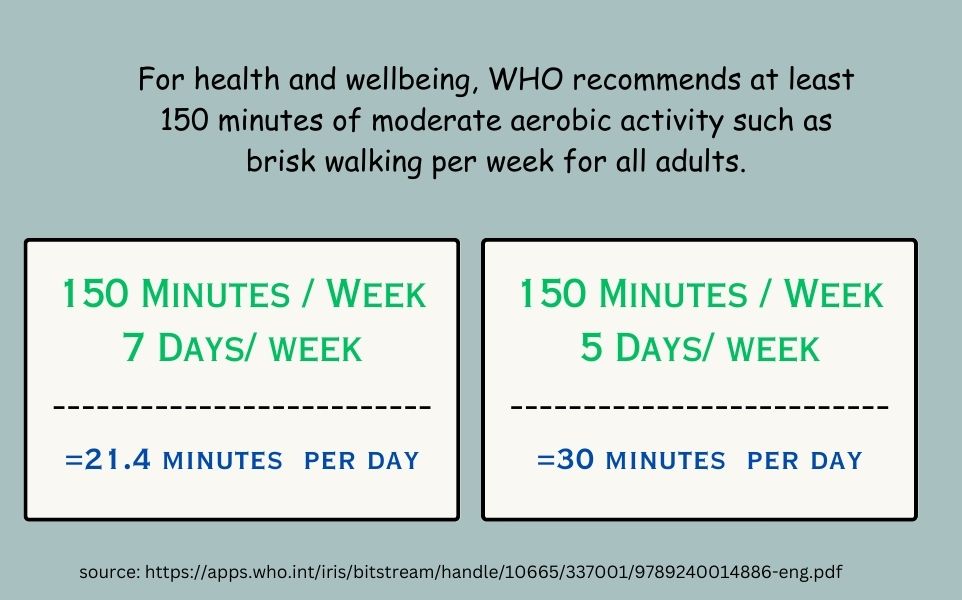In today’s fast-paced world, finding time for exercise can be a challenge. Many people are constantly on the go, juggling work, family, and social commitments, leaving little room for physical activity. However, incorporating exercise into our daily routine is crucial for maintaining good health and well-being. Walking is one of the simplest and most accessible forms of exercise, requiring no special equipment or training. But is 20 minutes of walking a day enough to reap the benefits? Let’s explore this question and delve into the impact of walking on our overall health.
Firstly, it’s important to note that any amount of physical activity is better than none. Even small amounts of activity, such as 20 minutes of walking a day, can provide health benefits. According to a study published in The American Journal of Clinical Nutrition, just 20 minutes of brisk walking per day can reduce the risk of premature death by up to 30%. This study followed over 334,000 men and women for 12 years and found that even low levels of physical activity, such as walking, were associated with improved health outcomes.
In another study from the University of Leicester, just 20 minutes of daily walking can reduce the risk of heart attack and stroke by 8 %. If you walk for 40 minutes, your chance of heart disease can decrease by 18 to 20% (source). This study also found that higher levels of physical activity were associated with even greater health benefits, but the key takeaway is that even small amounts of physical activity, such as 20 minutes of walking a day, can have a significant impact on health.
The American Heart Association (AHA) suggests that even a short, 20-minute brisk walk daily can help people maintain cardiovascular health.
Before we delve into the specifics of a 20-minute daily walk, it’s crucial to understand the general exercise guidelines. The World Health Organization recommends at least 150 minutes of moderate-intensity or 75 minutes of vigorous-intensity aerobic physical activity per week or an equivalent combination of both. This might sound a bit daunting, but if you break it down, it translates to approximately 20 minutes of moderate-intensity activity, such as brisk walking, each day.
Moderate-intensity aerobic activity includes brisk walking, cycling, swimming, and dancing. Vigorous-intensity aerobic activity includes activities such as running, fast cycling, and high-intensity interval training (HIIT). Both types of activity can provide health benefits, but the level of intensity may affect the amount of time needed to achieve those benefits.

So, how does walking fit into this guideline? According to the Centers for Disease Control and Prevention (CDC), walking at a brisk pace of 3.5 miles per hour (or a pace that makes you breathe harder but still allows you to carry on a conversation) is considered moderate-intensity aerobic activity. This means that if you walk for 20 minutes daily at this pace, you will have completed the recommended minimum amount of weekly physical activity.
Are 20 Minutes of Walking Enough?
So, back to the original question. If you are walking briskly for 20 minutes daily, then yes, you are meeting the basic guidelines for physical activity. That’s excellent news for those new to exercise, those with certain health limitations, and those with busy schedules. Even a short walk can reduce risks for chronic diseases like heart disease and diabetes, improve mood and sleep, and boost overall quality of life.
However, these are minimum recommendations. More physical activity generally provides additional health benefits. For example, doubling the recommended amount of exercise to 300 minutes of moderate-intensity activity each week can provide even greater health benefits.
However, if weight loss is your goal or if you’re trying to achieve higher levels of fitness or athletic performance, 20 minutes of walking may not be enough. The American College of Sports Medicine suggests that 150-250 minutes per week of moderate-intensity physical activity is needed for weight loss, and more may be necessary to maintain weight loss or reach certain fitness goals.
This doesn’t mean you need to abandon walking. Instead, you might need to increase the duration, frequency, or intensity of your walks. For instance, you could walk for longer periods, add additional walks throughout the day, or incorporate intervals of power walking or hills.
Furthermore, if you are currently inactive, starting with 20 minutes of walking per day can be a great first step towards a more active lifestyle. As you become more comfortable with this level of activity, you can gradually increase the duration or intensity of your walks.
Factors Impacting the “Enough” in Exercise
Whether 20 minutes of walking daily is “enough” depends on various factors:
- Age: Older adults or individuals with certain health conditions might find that a 20-minute walk each day is sufficient, especially if they’re moving from a sedentary lifestyle. Younger, healthier individuals might require more intense or prolonged exercise to achieve their health or fitness goals.
- Health status: Individuals with health conditions may need to adjust their exercise regimen. For example, people with arthritis might find that shorter, more frequent walks are more manageable than longer walks.
- Fitness level: For those already fit, a 20-minute walk might serve as a warm-up or cool-down rather than a main workout. They might need more vigorous or prolonged exercise to maintain their fitness level or make further improvements.
- Personal goals: If your goal is weight loss, you might need more than a 20-minute walk daily, depending on other factors like diet and metabolic rate. If your goal is general health and wellness, a 20-minute walk might be sufficient, especially when starting out.
Benefits of 20 Minutes Walking a Day
Let’s delve into the benefits of walking and examine whether 20 minutes a day is sufficient to meet the recommended guidelines.
1. Cardiovascular Health:
Regular aerobic exercise, such as walking, strengthens the heart and improves cardiovascular health. It helps lower blood pressure, reduces the risk of heart disease, and improves overall circulation. While any physical activity is better than none, research suggests that longer durations of exercise may have greater cardiovascular benefits. However, a 20-minute daily walk can still contribute to improved heart health, especially for those who are currently sedentary.
2. Burn calories:
One of the most obvious benefits of walking is that it helps you burn calories. Depending on your weight and pace, you can burn up to 110 calories in just 20 minutes of walking. During a 20-minute walk at 3.5 mph: 130-pound person burns 75 calories. 155-pound person burns 89 calories. 180-pound person burns 103 calories. This may not seem like a lot, but over time it can add up and help you maintain a healthy weight.
This table estimates the number of calories you can burn in 20 minutes based on your body weight and walking speed.
| Weight | 2.5 mph | 3.0 mph | 3.5 mph | 4.0 mph |
| 130 lbs./ 59 kg | 60 cal. | 65 cal. | 75 cal. | 98 cal. |
| 155 lbs. / 70 kg | 70 cal. | 77 cal. | 89 cal. | 117 cal. |
| 180 lbs. / 82 kg | 80 cal. | 90 cal. | 103 cal. | 136 cal. |
| 205 lbs. / 93 kg | 93 cal. | 102 cal. | 118 cal. | 155 cal. |
3. Reduce the risk of death:
Studies have shown that regular walking can reduce the risk of premature death. Walking for just 20 minutes a day can lower the risk of death from all causes by up to 30%.
4. Boost energy:
Walking can give you an instant boost of energy. It increases blood flow and oxygen to the muscles and brain, which can help you feel more alert and focused.
5. Mental Well-being:
Engaging in regular physical activity has significant mental health benefits. Walking, in particular, has been shown to reduce symptoms of anxiety and depression, boost mood, and improve overall mental well-being. While the duration of exercise may affect the magnitude of these benefits, even a short 20-minute walk can elevate mood, reduce stress, and promote relaxation. Incorporating walking into your daily routine can be a valuable strategy for maintaining good mental health.
6. Bone Health:
Weight-bearing exercises, such as walking, are beneficial for bone health. Walking helps strengthen bones, reduces the risk of osteoporosis, and improves overall bone density. While longer durations of exercise may provide more substantial benefits in terms of bone health, a 20-minute daily walk can still contribute to maintaining strong and healthy bones, particularly when combined with other weight-bearing activities and a balanced diet rich in calcium and vitamin D.
7. Longevity:
Numerous studies have shown that regular physical activity is associated with increased longevity. Walking, even for shorter durations, has been linked to a reduced risk of premature death and improved life expectancy. While longer exercise sessions may offer greater longevity benefits, a 20-minute daily walk is a positive step towards a healthier and longer life.
8. Lowered Blood Pressure:
Regular physical activity like walking can help lower high blood pressure.
9. Improved Digestion:
Regular walking can improve your body’s ability to digest food and can help reduce symptoms of constipation.
10. Boosted Immune Function:
Regular moderate-intensity exercise, like walking, can boost the immune system and help the body fight off illnesses.
11. Improve creativity:
Walking has been shown to improve creativity and imaginative thinking. Taking a walk can help clear your mind and stimulate your brain, making it a great activity for writers, artists, and anyone who needs to think creatively.
12. Better sleep:
Walking can also improve sleep quality. Regular exercise has been shown to improve sleep duration and quality, helping you feel more rested and refreshed.
It is important to note that while a 20-minute daily walk can provide several health benefits, it should ideally be supplemented with additional physical activities throughout the week. Combining walking with other forms of exercise, such as strength training, stretching, or more vigorous aerobic activities, can enhance overall fitness and maximize the health benefits obtained.
Furthermore, it is crucial to consider individual factors when determining the adequacy of a 20-minute daily walk. Factors such as current fitness level, health conditions, and personal goals should be taken into account. Some individuals may require more intense or longer-duration exercises to achieve their desired outcomes. Consulting with a healthcare professional or a certified fitness instructor can help tailor an exercise plan that suits individual needs and goals.
Conclusion
In summary, yes, 20 minutes of walking daily can meet general physical activity guidelines for health benefits. It’s a simple, accessible way to start incorporating exercise into your routine. However, depending on your specific fitness or weight loss goals, you may need to increase your walks’ intensity, duration, or frequency.
Ultimately, the most vital point is to engage in regular physical activity that you enjoy and can sustain long term. Whether that’s a 20-minute walk, a vigorous run, a dance class, or a combination of activities, the best exercise is the one that you’ll do consistently.

